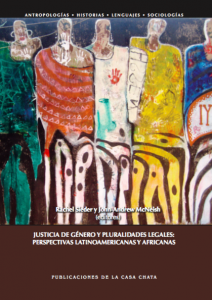
Dra. María Teresa Sierra, is a research professor at the Center for Research and Advanced Studies in Social Anthropology (CIESAS) in Mexico City. She is member of Mexico’s National Researchers’ System (SNI 3) and member of the Mexican Academy of Science. She received a Ph.D. in Sociology from the University of Paris VIII. Her areas of research include: Legal and political anthropology gender, violence, and human rights; identity politics and cultural diversity. She is member and founder of the Latin American Network of Legal Anthropology and was president of the Sixth Congress, held in Mexico. Her publications include the book Discurso, cultura y poder (CIESAS) (1992), the edition of the book “Haciendo justicia”. Interlegalidad, derecho y género en regiones indígenas (2004), the book, Neoindigenismo en tiempos del PAN: Identidad, poder y legalidad coordinated with Aida Hernandez and Sarela Paz (2004), both published by CIESAS and Porrúa eds, the book Justicia, diversidad y pueblos indígenas en tiempos de globalización (with Magdalena Gomez, Victoria Chanaut and Hector Ortiz) (CIESAS-FLACSO, Ecuador) 2011, and Justicias indígenas y Estado. Violencias contemporáneas (With Aida Hernandez and Rachel Sieder CIESAS FLACSO, 2013.
She has coordinated several research projects, most recently with Aida Hernandez Globalización, derechos indígenas y justicia: una perspectiva desde el género y el poder that deals with the study of state multiculturalism and its impact in the areas of justice and collective identities in Mexico and Guatemala. As part of this research project she studied indigenous jurisdictions and autonomy in the Community Police of Guerrero, Mexico. Currently she is involved in a collective research project Project Women and Law in Latin America: Justice, Security and Legal Pluralism, coordinated by Rachel Sieder. Within this project, she develops collaborative research on Indigenous women, security and access to justice in the Coast – Mountain of Guerrero, Mexico.
Academic article: El pueblo me’phaa confronta el extractivismo minero. Ecología de saberes en la lucha jurídica
In this essay, I approach the experience of an indigenous people in Mexico who managed to defy and halt mining extractivism through legal struggle and social mobilization. Two aspects are salient: a) the way in which their own legal system and their own forms of knowledge enter legal discourse and challenge it to take into account other worldviews; b) the impact of those processes on collective identities and the reshaping of territorial autonomies. From this perspective, I analyze the scope and limits of an ecology of knowledge in the judicial process and the role of anthropological discourse in its construction.
academic article: ANTHROPOLOGICAL EXPERT WITNESS AND THE JUDICIALIZATION OF INDIGENOUS RIGHTS IN MEXICAN ELECTORAL POLITICS.
In this text we analyze the role of anthropological expert witnesses in an electoral trial concerning indigenous peoples’ right to elect municipal authorities through customs and traditions (“usos y costumbres”) instead of conventional party politics. This process regards an indigenous municipality in the state of Guerrero, México. We highlight the transformative role of the law in the judicialization of the indigenous claims, the tensions involved in reports to “authenticate” the permanence of indigenous normative systems and the claims to cultural validity for indigenous political representation in the municipal political arena. By doing so we want to contribute to the debates on the role of anthropological reports in the advancement of indigenous rights.
Academic article:Alertas de género y mujeres indígenas: interpelando las políticas públicas desde los contextos comunitarios en guerrero, México
Based on the social perceptions of indigenous defenders regarding gender harm and access to justice we analyze how various orders of oppression that affect indigenous women lives operate at the local level, which is often not taken into account by state policies for the prevention of violence. From an intersectional and decolonial perspective, this essay interpellates feminist institutional policies regarding feminicidal violence and their epistemological limitations to registering the concatenation of everyday and structural violence that causes harm to indigenous women and their peoples.
Academic Article: Guerrero, Mexico: Community Police Confront Macro-Violences
Academic Article: Demanding Justice and Security: Indigenous Women and Legal Pluralities in Latin America
Academic Article: Indigenous Women Fight for Justice: Gender Rights and Legal Pluralism in Mexico
This chapter analyses indigenous women’s strategies to secure gender justice in the context of complex legal pluralism in Mexico. It refers to the obstacles they face to access justice before indigenous and state authorities and underlines indigenous women’s efforts to redefine indigenous law. The official recognition of legal pluralism in the country has provoked both a discussion of multicultural forms of justice and of gender rights, with different consequences for indigenous women’s demands. The two emblematic experiences of women’s organization within collective forms of indigenous justice in Mexico analysed in this chapter point to the complex realities of women’s lives and the ways in which the tensions between individual and collective rights are played out in context of extreme marginalization and gender violence.
Translated to English: Rachel Sieder & John A. McNeish (eds.) (2012) Gender Justice and Legal Pluralities. Latin American and African Perspectives, London, Routledge.
Journalistic Article: Emerging local responses to violence and impunity: Ayotzinapa and public security crisis in Guerrero, Mexico
The crisis of human rights in Mexico due to the unpunished murder of 6 people and the forced disappearance of 43 students in the city of Iguala, state of Guerrero, in September 2014, not only reveals a policy of death in the country, but also the strength of social organizations and indigenous peoples to demand justice and to generate grassroots alternatives to confront violence and insecurity. In this article I highlight these two aspects, the security crisis involving the facts in Guerrero and the responses of local organized actors, in particular the role of the Community Police, to face it. Through their practice they demonstrate the failure of the public security policies of the State.
ABRIENDO BRECHA:The Community Police Women of Guerrero
The video “Abriendo Brecha: The Community Police Women of Guerrero” reveals the committed participation of women in the building of the most emblematic institution of the indigenous peoples of Guerrero, the Regional Security, Justice and Reeducation Communitarian System (CRAC -PC). It shows that women are not only assuming posts in the community justice system but also defending their rights as women within the same institution. The video is the result of a collaborative work with the promoters of justice.
CONTACT: tsierra@ciesas.edu.mx / mtsierrac@hotmail.com
